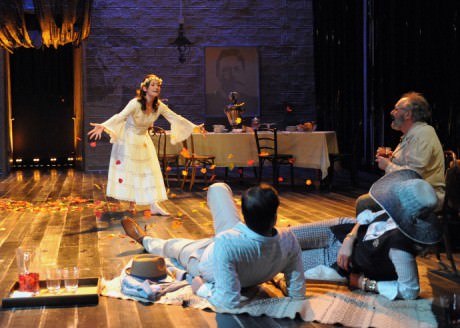Stupid Fucking Bird, Aaron Posner’s 2013 adaptation of Anton Chekhov’s late 19th century The Seagull, returns like the phoenix to Woolly Mammoth Theatre Company with its stellar cast and crisp direction. The production entertains with its tongue-through-cheek perspective, particularly if you aren’t too sensitive to suicide jokes and existential despair made light. Think extended Jerry Seinfeld episode with a curve toward the tragic.

I didn’t see Stupid Fucking Bird the first time round: the play’s pretentious title steered me clear. Its success lured me for this second time around: the script’s adolescent perspective on life’s muddle did not win me over, however; some of its characters did, and that to me is Chekhov’s gift and original vision.
In Chekhov, the human trumps over all things philosophical. Thus, if you are hoping for life to offer some great reward, you will be left wanting. If you accept the fact that the extent of life is the loving and living, then you won’t be disappointed. Now, there is also wealth and a deadening habit of mind, but in Stupid Fucking Bird if you are hoping for justice and economic fairness, you are an idealistic idiot and deserve your misery.
And that, it seems to me, is the one great difficulty in adapting Chekhov’s masterwork to a contemporary American theatre-going audience. Yes, Stupid Fucking Bird is written with a contemporary American theatre-going audience in mind: make that not the old and somewhat stodgy theatre-going audiences but its hip, upwardly mobile audience, with its members feeling like they have an infinite number of possibilities at their proverbial fingertips–not to mention distractions like I-phones and art openings and sexual liaisons and yes obviously theatre, lots of theatre into which they can escape for an evening.
From this perspective the idealist is seen as a social misfit.
Enter Konstantin (or Con), the born-with-an-artist’s-spoon-in-his-mouth son of Irina (or Emma). Played with great intensity by Brad Koed, this protagonist’s idealism has had his substance stripped from him. This Con’s real ambition is not social renewal, not the changing of society nor the role of art in it, but rather his ambition lies in the vain hope of winning the love of his narcissistic mother-actress, i.e., goddess of art, (or ex-girlfriend-actress Nina [or Nina–yes, the name has not been changed for this character].
Unfortunately, without a genuine idealism, the central character of Chekhov’s story loses his veracity. We the audience are left listening instead to the relentless whining of a young man for his love, or for his mother or girlfriend’s approval. We see nothing of the unfulfilled dreams of an artist hoping for a better world: that character disappears in the vapors of a post-justice America in much the same way Chekhov’s original text evaporates in this post (dare I say it) modern spin on entrenched yearning.
No amount of excellent interplay with the audience can save this formula from exhaustion, however: by the middle of the third act all hope for a bang has turned to a whimper, and an unspoken need for a therapist.
Con’s mother Emma is played by Kate Eastwood Norris. Ms. Norris gives this self-centered, aging actress real verve while underplaying any sense of that woman out of proportion with her self-worth: she really wants to be a good mother and a good person, and a good actress and the center of the universe. And we believe her; in fact, she does not come across as all that bad a human being even if she occasionally tells her son she will die if he persists. In fact, in Act II she really wins us over with a heartfelt monologue to her boyfriend, the writer Trigorin (or Trig), in which she argues for artists to behave maturely. As a result, we begin to wonder why Con has such problems with her (I mean, really, what does he have to complain about so endlessly?).
Con’s lover, or ex-lover Nina, is played by Katie Debuys. Ms. Debuys gives the character a vibrant energy, with which we immediately become enthralled. As the story develops we watch that energy entropy, consumed by life’s bad decisions, until by play’s end she is only a shadow of her former self. She becomes a tragic figure in a play that no longer has room for tragedy.
In this play about intersecting lovers’ triangles, Trig plays a vital role in two. Played by Cody Nickell, this supposedly egotistical writer (like the egotistical Emma) also comes across as a pretty nice guy. He isn’t a womanizer or a stuck-up, fame obsessed man who uses his success to win what he wants. Instead, he is the writer studying human nature and doing his best to capture its many dimensions and idiosyncrasies. Thus Con’s, as well as Nina’s, complaints against him seem like so much spilt vodka.
And then we have the doctor Sorn (a conflation of two of Chekhov’s characters) played by Rick Foucheux. The only non-artist in a play that has been made all about artists (the original Chekhov had quite a few non-artists), Mr. Foucheux’s Sorn is bittersweet to perfection: he says he has juicy secrets in his doctor’s bag, but it is quite the challenge to believe he isn’t lying. He wants to have secrets in the same way he wants to have genuine relationships.
The two best characters in this adaptation of, or riff on, The Seagull are Masha (Mash) and Medvedenko (Dev).
Mash, played by Kimberly Gilbert, is a dark, Goth-like ukulele player and song writer who pines relentlessly for Con. Ms. Gilbert’s Mash is a delight to watch, as she sings her simple ditties with an understated gloom. Her drunken discourse of life and art in Act II is a gem of where-did-that-come-from verbiage. Ironically, we learn from where Trig gets his literary flare.
Dev is played with wit and longing by Darius Pierce. We first meet Dev at the play’s opening during an odd conversation he has with Mash about whose poverty is worse (if either were poor we would never otherwise know). We grow fond of him in later scenes as he continues proclaiming his love to Mash despite her rejection of him. When, at the beginning of Act III, Dev and Mash sing a sweet, endearing duet together, a duet deserving of America’s Got Talent, we bow our heads and clap our hands to the both of them for finally making art and life work.

The production team for this intriguing production is top-notch. Directed by Howard Shalwitz, the show’s many variations and stylistic challenges are navigated gently. Set Designer Misha Kachman has created a theatrical space that befits a presentational performance: images of the renowned Chekhov in hip silhouettes grace the back wall of the theatre. Colin K. Bills has lit the production to perfection, offering audiences a plethora of shadow and nuance, while Laree Lentz’s costumes highlight each character’s personality.
To be sure, Stupid Fucking Bird is an adaptation of Chekhov’s masterpiece that befits a modern American theatre-going audience. It has all the qualities that define popular success: it is irreverent to a classic, it has a plethora of topical references, it has all the necessary cynicism and glib social commentary, it looks with disdain upon the idealistic and self-critical. Plus, it has a bit of audience participation and only seven characters. It ultimately might not be as satisfying as one would hope, but one could say the same for life in Chekhov’s Russia, or in an America of seemingly limitless potential.
All that said, I am, after all, but an ex-high school teacher and theatre artist who has had his fill of students who found everything both “stupid” and “fucking” and yet who did his level best to instill in them a sense of purpose greater than their own “stupid fucking” navels.
Running Time: Approximately 2 hours and 30 minutes, with one intermission.
Stupid Fucking Bird plays through August 17, 2014 at Woolly Mammoth Theatre Company – 641 D Street NW, in Washington, D.C. For tickets, call the box office at (202) 393-3939, or purchase them online.





